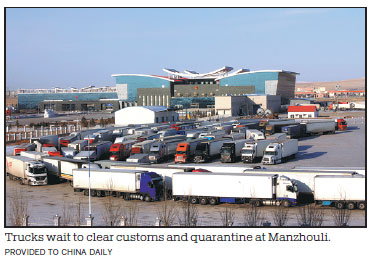At the border, a passage of time

Trains roar through the grand guomen, or national gate, in Manzhouli on a daily basis to cross the land border between China and Russia.
A gate has stood on this site since the late Qing Dynasty (1644-1911), and it has long been an iconic image of Manzhouli in the Inner Mongolia autonomous region.
The current guomen was built in 2008 and is the largest of its kind in China, at 105 meters long, 43.7 meters tall and 46.6 meters wide. Passing through it are two Russian-style broad gauge rail lines and a standard gauge line.
In the 1920s, it was through Manzhouli that early leaders of the Communist Party of China including Li Dazhao, Chen Duxiu, Qu Qiubai, Liu Shaoqi and Zhou Enlai got in touch with Communist International and the Communist Party of the Soviet Union.
Later, the Soviet Red Army crossed at Manzhouli to support the Pacific War (1941-45), while the city also became a key channel for transporting military supplies during the War of Liberation (1946-49) and the 1950-53 Korean War.
Since the founding of the People's Republic of China, the development of Manzhouli has been largely influenced by the relationship between China and Russia, including its economy.
Standing at the gateway between Russia and Mongolia, Manzhouli was among 14 cities to be given preferential policies to encourage cross-border trade in 1992.
It is now China's largest land port. Last year, the total cargo volume was 31 million metric tons and the total import-export volume was 33.3 billion yuan ($4.8 billion), according to official data.
Local media also reported that 1,394 international China Railway Express services pulled 114,684 containers carrying cargo worth over $6.63 billion through the port from January to October. The number of trains represented a 28.2 percent year-on-year increase.
Compared with shipping and ordinary international trains, CR Express trains are said to be more punctual, time-efficient and economical due to the freight allowance, resulting in reduced costs for enterprises.
The city's customs authority said 51 CR Express services crossed the border at Manzhouli in the first 10 months of the year. These services reached 28 cities in 11 European countries, with the farthest destination being Hamburg in Germany.
Yet few import-export companies in Manzhouli are using the services, according to Guo Haitao, director of foreign trade for the local foreign trade and economic cooperation bureau.
According to local media, only 85 CR Express trains departed from or ended their journey in the city from January to July, and local companies are being encouraged to use the services to cut costs.
As Manzhouli's rail system has developed, so too has its road port, which is now the only one in China with 24-hour customs clearance.
Fruits and vegetables account for over 85 percent of exports through the road port, while imports are mainly scrap steel and timber, according to the local authorities.
Meng Lin, who has been exporting fruits and vegetables since the mid-1990s, said it used to take two or three days to clear customs and quarantine at Manzhouli, which was too long for fresh produce. Now, it takes only hours.
With the development of warehousing and transportation technologies, fruits and vegetables that are not easily stored, such as peaches, tomatoes and peppers, can be exported to as far as Moscow and St. Petersburg in two weeks, she said.
Last year, her company managed to export mangoes grown in Vietnam to Russia, something she previously thought not possible.
Meng, who also heads the local trade association, said although the sector has been hit by both the 2008 financial crisis and the rapid devaluation of the Russian rouble in 2013 and 2014, many local businesses have weathered the storm.
"The Belt and Road Initiative has brought new ways of cooperation, which have been welcomed by our Russian partners," she said.
"Local enterprises have gradually understood the role they play and are more steadfast now."

(China Daily 12/12/2018 page7)
MOST POPULAR
- 1 China to give visa-free treatment to another 9 countries
- 2 China fully opens manufacturing sector to foreign investors in landmark opening up move
- 3 China's import expo attracts record-breaking participating countries, exhibitors
- 4 China's door opening even wider to foreign visitors, businesses
- 5 China revises rules to ease foreign strategic investment in listed firms
Editors' Picks
 Infographic:
China's public holidays for 2025
Infographic:
China's public holidays for 2025
 Infographic:
Basic facts of APEC
Infographic:
Basic facts of APEC
 Infographic:
Wrapping up the 7th CIIE: Data recap
Infographic:
Wrapping up the 7th CIIE: Data recap




